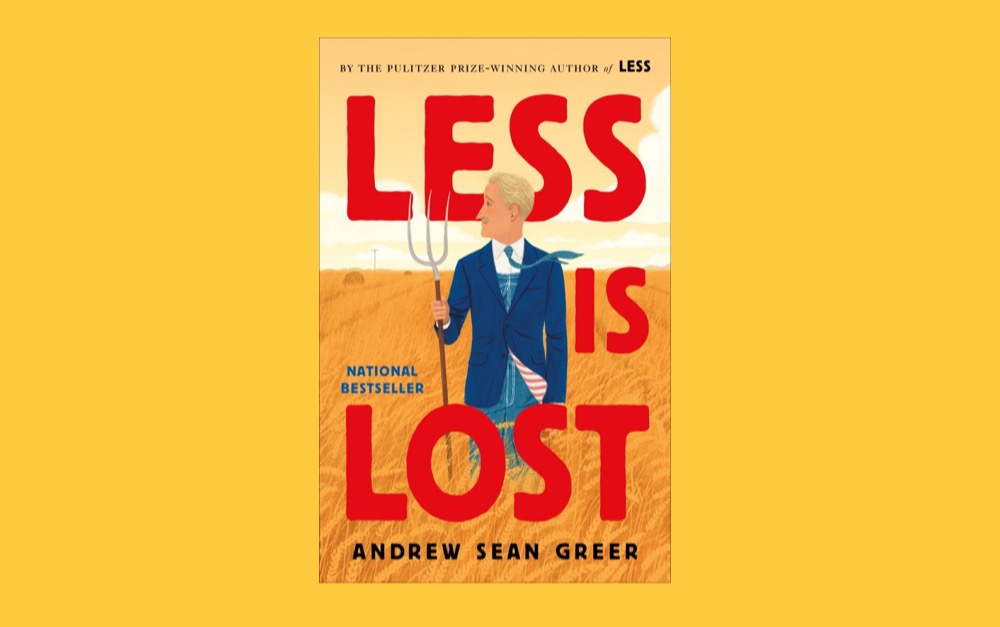After reading local writer Andrew Sean Greer’s Pulitzer Prize-winning 2017 novel Less, I realized I would never be invited to join a judging panel of said award. Contrary to what seems to be the position taken by everyone else on the planet—and with a deep courtesy to Greer’s copious literary skills and humor wielded with weird precision—I failed to fall in love with the book’s protagonist. Arthur Less is a “moderately accomplished novelist” escaping all manner of demons personal and professional by going on an international book tour. I found his escapades and literary tirades tiresome, and his love-life commentary as a middle-aged gay white man, whiny, not winning.
So when Greer, who was already toting a Guggenheim Fellowship, NEA Grant, and various other awards when he scored the Pulitzer, showed up with a sequel, Less Is Lost (Little, Brown and Company; $31), I myself felt… lost. Should I abstain, thus avoiding a second shame-faced confession for missing the Pulitzer pontoon? Or was it better to engage, hoping for redemption; to at last climb aboard the good ship We Love Greer (and Arthur Less) with everyone else? Soldiering ahead, I read Less Opus 2, despite my doubts.

Boy, am I glad I did. Either I’ve changed—not likely—or Greer hammers a home run in this second outing with Less, which involves similar topics as the first novel having to do with love, family, fame, or lack thereof. The book had me laughing out loud and reading sentences, and eventually, the entire book, a second time to test if there was a loss of mirth. With each repeat, I discovered surprising surprises. Honestly? I expect to never again be so glad a Pulitzer Prize-winning author wrote a sequel featuring the same central character and themes.
In Less is Lost, we meet up with a Less who is narrated sporadically throughout the novel by his lover, Freddy Pelu. Less is the same caliber “Minor American Writer,” although now of an unspecified age a few years beyond 50. Mourning the death of his first love, poet Robert Brownburn, with whom he lived as a worshipful lesser being for 15 years, Less is puzzling over his grief and how to behave. He’s also grappling with an estranged relationship with his dying father and is blown asunder by financial ruin resulting from a decade of overdue rent bills. Facing the physical and mental paroxysms of aging, he embarks on a circular, domestic journey in the United States that begins and ends in San Francisco, and is meant to make money at any cost.
There are difficulties with planes, trains, buses, “vowel dissidents,” naked strangers in a hot tub in the Navajo Nation, a pug named Dolly, a camper van named Rosina, a best-selling sci-fi novelist named H.H.H. Mandern (who appeared, barely, in the first novel), a commune character whose mantra, “Know no no,” Greer uses to great comedic effect, and a donkey, whale, moose, and more.
No need to spoil the fun of reading the novel yourself, but what makes it so much more than silly is authentic pain that is the taproot for all of Less’s semi-adorable fumbling. Rumbling underneath the giggling is a question Less confronts. It is a variation of the inner alienation and self-doubt every person alive has at one time experienced: the terrifying idea of being a fraud. In his case, it is to ask, am I a “bad gay”? Has everything about his life and love and career been performative? He’s tried so hard, after all:
“He joined a gym that turned out to be a sex dungeon. He joined a political party that turned out to believe a conspiracy theory about government health clinics. He joined a German-language society that turned out to be a sex dungeon. He joined a book group that turned out to be only for a political party. He joined a role-playing game club that turned out to be a sex dungeon. He joined a sex dungeon that turned out to be a government health clinic. It was all so confusing.”
It is true that Greer, for all his cleverness, can bite off more than one mouth can chew. For example, he aims questions about marriage as an institution at the foundation of America’s idealistic, irrational government and cultural origins with mixed success. But Greer reminds us to think about life’s pastiche, about people other than white heterosexual cis-men, about being split and stitching ourselves back together again and again. I, for one, prefer to read a novel that asks all manner of huge questions, even questions it has no “right” to ask and will never answer. Better that than to nibble and be safe. Although Greer in interviews has said this was to be his last Less book, I’m hoping he—and Less—return for a third outing.
Help us save local journalism!
Every tax-deductible donation helps us grow to cover the issues that mean the most to our community. Become a 48 Hills Hero and support the only daily progressive news source in the Bay Area.
Buy Less is Lost here.






